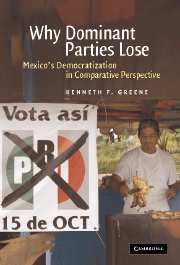1 - The Puzzle of Single-Party Dominance
Published online by Cambridge University Press: 27 July 2009
Summary
This book is about single-party dominance, its persistence, and its downfall. Dominant parties have maintained continuous executive and legislative rule for decades despite genuine partisan competition in countries spanning almost all world regions. In these systems, opposition parties compete but lose in open elections for such extended periods of time that we can speak of a “dominant party equilibrium.” What sustains this equilibrium and what makes it break down is the subject of this book. Fashioning an adequate explanation is important partly because the current literature falls short and partly because explaining single-party dominance has profound implications for our understanding of the forces that encourage or stunt partisan competition, the process of opposition party building in inhospitable circumstances, the quality of political representation, and the dynamics of regime stability or breakdown in hybrid systems that combine authoritarian and democratic features.
This book focuses both on the question of single-party dominance in general and on the specific case of Mexico where the Institutional Revolutionary Party (PRI) maintained power for longer than any noncommunist party in modern history. The PRI and its predecessors won every presidential election from 1929 to 2000, held the majority in Congress until 1997, won every governorship until 1989, and controlled the vast majority of municipalities. It was so powerful and seemingly unshakable that leaders in other developing countries wanted their own PRI (Krauze, 1997: 549–550), and major political actors inside Mexico thought of it as virtually “the only game in town.”
- Type
- Chapter
- Information
- Why Dominant Parties LoseMexico's Democratization in Comparative Perspective, pp. 1 - 30Publisher: Cambridge University PressPrint publication year: 2007



